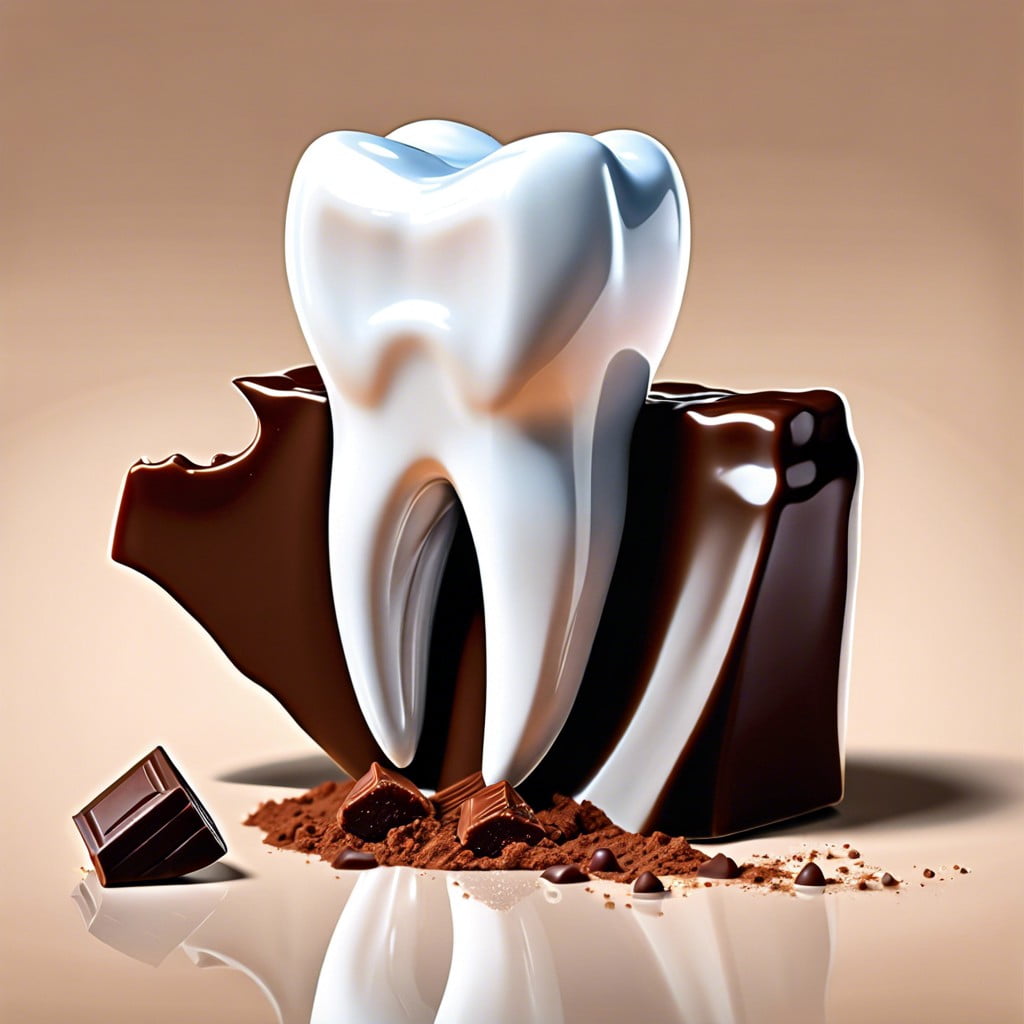Dark chocolate, abundant with antioxidants and offering a host of health benefits, reveals its true richness in this enlightening article.
Key takeaways:
- Dark chocolate contains antioxidants and nutrients like fiber and iron.
- It may help lower blood pressure and improve cholesterol levels.
- Moderate consumption may reduce the risk of heart disease.
- Enjoy dark chocolate as part of a balanced diet with portion control.
- Be mindful of potential risks, such as weight gain and sleep disturbances.
Inside
Nutritional Profile of Dark Chocolate

Dark chocolate boasts a rich array of nutrients in modest amounts. A standard portion provides antioxidants such as flavanols and polyphenols, which can neutralize harmful free radicals in the body.
Alongside these, it contains varying levels of fiber, iron, magnesium, copper, manganese, potassium, phosphorus, zinc, and selenium, depending on the cocoa content and brand.
It is also a source of caffeine and theobromine, which may enhance alertness and mood.
However, it’s important to note that it contains sugars and saturated fats, which should be consumed in moderation.
The higher the cocoa content, typically ranging from 70% to over 85%, the more pronounced these nutrients are, often correlating with lower sugar levels.
Effects of Dark Chocolate On Blood Pressure and Cholesterol Levels
Dark chocolate contains flavonoids, which have been shown to stimulate the production of nitric oxide. This compound aids in relaxing blood vessels and reducing arterial stiffness, leading to improved blood flow and lower blood pressure.
Additionally, certain studies indicate that consuming moderate amounts of dark chocolate can lead to a slight decrease in LDL (“bad”) cholesterol and an increase in HDL (“good”) cholesterol. This effect is attributed to the presence of polyphenols, which may help to prevent the oxidation of LDL cholesterol, a key factor in the development of heart disease.
While these benefits are promising, it’s essential to choose dark chocolate with a high cocoa content and to consume it in moderation, as it is also high in calories and can contribute to weight gain if eaten in excess.
Dark Chocolate and Heart Disease Risk Reduction
Research has demonstrated a link between moderate dark chocolate consumption and lowered risk of heart disease. Flavanols, the antioxidants present in chocolate, have a favorable impact on heart health by improving blood flow and reducing inflammation.
A study published in the “British Medical Journal” suggests consuming dark chocolate could potentially reduce the risk of heart disease by one third. Another research finding from “The Journal of Nutrition” indicates that dark chocolate can help by maintaining the elasticity of blood vessels, which is essential for healthy blood pressure regulation.
To harness these benefits, it’s essential to choose chocolate with a high cocoa content, ideally above 70%, as this indicates a higher concentration of beneficial flavanols. However, it’s important to remember that moderation is key, as chocolate is also high in calories and fat.
Integrating dark chocolate into a balanced diet that includes a variety of heart-healthy foods can contribute to overall cardiovascular health.
Dark Chocolate As Part of a Balanced Diet
Incorporating dark chocolate into a balanced diet calls for moderation and mindfulness. A square or two can satisfy sweet cravings while providing beneficial nutrients.
Since dark chocolate is calorie-dense, sticking to a small portion prevents calorie overload. Pairing it with fruits, nuts, or whole grains can enhance nutritional value and add fiber, facilitating satiety and health benefits.
To ensure the chocolate’s positive attributes, choose varieties with at least 70% cocoa content, as they contain less sugar and more antioxidants.
Remember, dark chocolate is a complement to a diet rich in fruits, vegetables, lean proteins, and whole grains, not a substitute. Track your intake to savor the flavors and health perks without overindulgence.
Risks Associated With Dark Chocolate
While dark chocolate is often hailed for its potential health benefits, it’s important to consider the risks associated with its consumption. High in calories and fat, dark chocolate can contribute to weight gain if eaten in excess. Also, it contains caffeine and theobromine, both of which can cause sleep disturbances when consumed in large amounts, especially for those sensitive to these compounds.
For people with a chocolate allergy or lactose intolerance, even dark chocolate can trigger adverse reactions, although it generally contains less milk than milk chocolate. Moreover, it’s high in oxalates, which can increase the risk of kidney stones. Therefore, individuals with kidney stone concerns should moderate their intake.
Lastly, dark chocolate often contains added sugars and sometimes harmful heavy metals like lead and cadmium, as cocoa plants absorb these metals naturally from the soil. To minimize these risks, moderation is key, and choosing dark chocolate with a high cocoa content and low added sugars is advisable.




